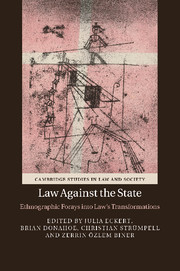11 results
Series page
-
- Book:
- Law against the State
- Published online:
- 05 June 2012
- Print publication:
- 24 May 2012, pp ii-iv
-
- Chapter
- Export citation
Law against the State - Title page
-
-
- Book:
- Law against the State
- Published online:
- 05 June 2012
- Print publication:
- 24 May 2012, pp v-v
-
- Chapter
- Export citation
Index
-
- Book:
- Law against the State
- Published online:
- 05 June 2012
- Print publication:
- 24 May 2012, pp 286-291
-
- Chapter
- Export citation

Law against the State
- Ethnographic Forays into Law's Transformations
-
- Published online:
- 05 June 2012
- Print publication:
- 24 May 2012
Copyright page
-
- Book:
- Law against the State
- Published online:
- 05 June 2012
- Print publication:
- 24 May 2012, pp vi-vi
-
- Chapter
- Export citation
Introduction: - Law’s Travels and Transformations
-
-
- Book:
- Law against the State
- Published online:
- 05 June 2012
- Print publication:
- 24 May 2012, pp 1-22
-
- Chapter
- Export citation
Contributors
-
-
- Book:
- Law against the State
- Published online:
- 05 June 2012
- Print publication:
- 24 May 2012, pp ix-xiii
-
- Chapter
- Export citation
Contents
-
- Book:
- Law against the State
- Published online:
- 05 June 2012
- Print publication:
- 24 May 2012, pp vii-viii
-
- Chapter
- Export citation
Law Against the State - Half title page
-
- Book:
- Law against the State
- Published online:
- 05 June 2012
- Print publication:
- 24 May 2012, pp i-i
-
- Chapter
- Export citation
Acknowledgements
-
- Book:
- Law against the State
- Published online:
- 05 June 2012
- Print publication:
- 24 May 2012, pp xiv-xiv
-
- Chapter
- Export citation
Chapter 2 - Naming, claiming, proving? The burden of proof issue for Russia’s indigenous peoples
-
-
- Book:
- Law against the State
- Published online:
- 05 June 2012
- Print publication:
- 24 May 2012, pp 44-69
-
- Chapter
- Export citation



